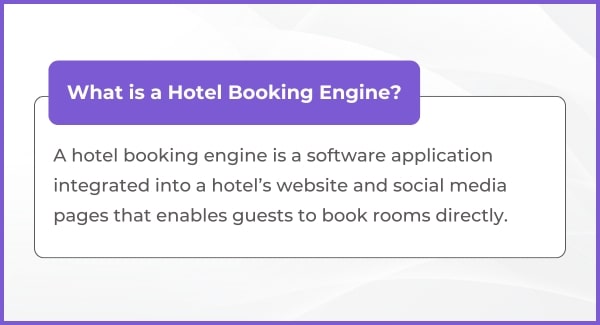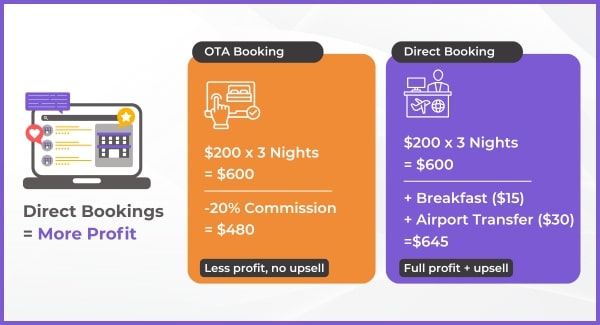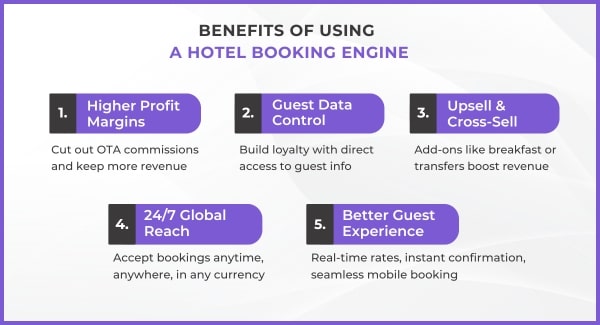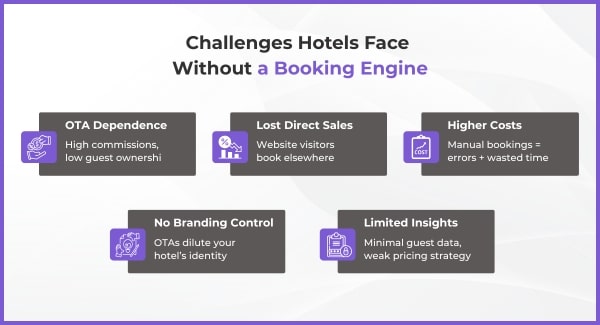The Ultimate Guide to Hotel Booking Engines
Turning lookers into bookers is simple with the right booking engine, drive direct reservations, boost revenue, and own your guest relationships, all through your hotel website.
Introduction
The hotel industry is becoming increasingly competitive, with travelers expecting instant, seamless booking experiences. Now, a hotel’s website is not just its digital brochure, it’s also a powerful sales channel. But without the right technology, hotels risk losing direct bookings to Online Travel Agencies (OTAs) and competitors.
That’s where a hotel booking engine comes in. This essential tool transforms your website into a revenue-generating machine, enabling guests to book directly with you in real time. The result? More revenue, stronger guest relationships, and less dependency on commission-heavy third parties.
What is a Hotel Booking Engine?

A hotel booking engine is a software application integrated into a hotel’s website and social media pages that enables guests to book rooms directly. Think of it as your hotel’s digital front desk, available 24/7, across time zones, and in multiple languages and currencies.
Instead of calling or emailing, guests can:
- Check real-time availability and rates
- Browse room types, amenities, and promotions.
- Select add-ons like breakfast, late checkout, or spa treatments.
- Make secure payments instantly.
- Receive automated confirmation emails
For example, if a traveler lands on your website after seeing an ad or discovering you on Google, a booking engine makes the difference between browsing and booking. Without it, they’ll likely leave your site and book through an OTA.
More details in: What is a Hotel Booking Engine and Its Importance
Why Hotels Need a Booking Engine?
Guests today expect convenience, speed, and trust when booking their stay. Most travelers book online, compare rates instantly across websites, and want immediate confirmation with secure payment options. Hotels that don’t have a booking engine risk losing these potential guests to faster OTA platforms.
A booking engine changes the game by:
- Capturing direct bookings, which are far more profitable than OTA reservations.
- Offering a frictionless experience across web and mobile.
- Reducing dependency on third parties and their hefty 15–30% commissions.
- Make secure payments instantlyBuilding brand loyalty by owning the guest relationship.
- Receive automated confirmation emails
To see the difference, imagine a guest books a $200/night room for three nights:

- Through an OTA, the hotel earns $480 after 20% commission.
- Through a direct booking, the hotel earns the full $600 plus opportunities to upsell extras like breakfast ($15) or airport transfer ($30).
Multiply this across hundreds of bookings, and the impact on revenue becomes undeniable.
Related read: Booking Engine for Hotels: A Non-Negotiable
Benefits of Using a Hotel Booking Engine
A booking engine is more than just a reservation tool; it’s the backbone of a hotel’s direct booking strategy. Hotels that adopt a well-designed booking engine immediately see the difference in revenue, efficiency, and guest satisfaction.
A booking engine is more than just a reservation tool; it’s the backbone of a hotel’s direct booking strategy. Hotels that adopt a well-designed booking engine immediately see the difference in revenue, efficiency, and guest satisfaction.
1. Higher Profit Margins: Every OTA booking comes at a cost, usually between 15–30% commission. Direct bookings through a hotel booking engine cut out the middleman, allowing hotels to retain more revenue per booking. This extra margin can be reinvested into guest experience, marketing, or staff development.
2. Greater Control Over Guest Relationships: With OTAs, guest data is often limited. A booking engine gives hotels direct access to guest information, allowing them to personalize pre-arrival communication, upsell services, and foster loyalty with tailored offers.
3. Upsell and Cross-Sell Opportunities: Instead of waiting until check-in, hotels can encourage guests to upgrade their room, add breakfast, or book an airport transfer right when they reserve online. These small add-ons significantly increase average booking value.
4. 24/7 Global Accessibility: Travelers don’t follow office hours. With a booking engine, guests from any part of the world can make reservations at any time, in their own currency and language.
5. Improved Guest Experience: From real-time rates and instant confirmation to seamless mobile booking, a booking engine reduces friction in the guest journey. A smooth booking process is the first impression — and it sets the tone for the stay.

More in Hotel Booking Engine Essentials
Challenges Hotels Face Without a Booking Engine
Hotels that don’t invest in a booking engine often face challenges that hinder growth.
1. Heavy Dependence on OTAs: While OTAs bring visibility, relying on them alone makes hotels vulnerable to commission costs, fluctuating algorithms, and limited guest ownership.
2. Lost Direct Booking Opportunities: Imagine a potential guest landing on your website after seeing a campaign or reading a blog. Without a booking engine, the guest will leave to book on an OTA instead, leading to a lost direct sale.
3. Higher Operational Costs: Handling bookings via email or phone is not just slow, it also increases the chances of double bookings and errors. Staff time is better spent on guest service than manual admin work.
4. No Control Over Branding: On OTA listings, your property is just one among many. Without a booking engine on your site, you miss the chance to deliver a branded, personalized booking experience.
5. Limited Insights: Guest data shared by OTAs is often minimal. Without your own booking system, you lose valuable insights into booking patterns, demographics, and preferences — data that could help shape pricing and promotions.

How Does a Hotel Booking Engine Work?
A hotel booking engine may seem complex on the surface, but its function is simple: it connects guests directly to your hotel’s inventory and rates.
Here’s how it works step by step:
1. Guest Browses: A traveler lands on your website or social media page.
2. Selection: They choose dates, room type, and optional extras.
3. Inventory Check: The booking engine pulls real-time availability from your Property Management System (PMS).
4. Rates Displayed: Accurate prices and options are shown instantly.
5. Payment Processed: Secure gateways allow immediate, trusted transactions.
6. Confirmation Sent: Guests receive instant confirmation, while the hotel PMS updates automatically.
The integration between the booking engine, PMS, and channel manager ensures no double bookings and keeps your availability updated across OTAs as well.
Explore STAAH’s SwiftBook to see how this works in action.
Strategies for Optimizing Your Booking Engine for Higher Conversions
Simply having a booking engine isn’t enough, it must be optimized to convert browsers into bookers. Hotels that refine their booking flow often see double-digit increases in conversion rates.
1. Mobile-First Design: With more than half of bookings happening on mobile devices, your booking engine must be responsive, fast, and easy to use on smartphones.
2. Fewer Steps, More Conversions: A complicated process drives guests away. Keep booking to a few clicks: select dates, choose room, confirm, pay.
3. Engaging Visuals and Descriptions: High-quality photos, virtual tours, and detailed room descriptions create trust and inspire bookings.
4. Dynamic Pricing and Promotions: Offer member discounts, early-bird rates, or last-minute deals directly through your booking engine. Scarcity and urgency are powerful motivators.
5. Social Proof: Show reviews, ratings, and testimonials during the booking flow. Trust cues reassure guests they’re making the right decision.
6. Integration with Metasearch Platforms: Sync your booking engine with Google Hotel Ads or TripAdvisor, so when travelers search, they see your direct rates alongside OTA listings.
Related read Importance of a Hotel Booking Engine
Hotel Booking Engine & OTA: Which is Better for You?
OTAs and booking engines both play important roles in a hotel’s distribution strategy.
OTAs provide visibility: They introduce your hotel to global audiences who may not otherwise discover you. This exposure is especially valuable for smaller or independent hotels.
Booking engines provide profitability: Direct bookings through your website let you keep the full revenue, build guest loyalty, and reduce long-term dependence on third parties.
The Best Strategy: Use OTAs for reach, but nurture direct bookings as your most profitable channel. For example, when a guest books through an OTA the first time, use your booking engine to encourage repeat bookings directly — with loyalty discounts or special perks.
Find the right balance here: OTA & Direct Booking
Key Features to Look For in a Booking Engine
Choosing the right booking engine can transform your hotel’s performance. Look for features that align with your goals:
- Mobile optimization to capture last-minute, on-the-go bookings.
- Multi-language and multi-currency support to attract global travelers.
- Secure payment processing with trusted gateways.
- Integration with PMS and channel manager for seamless operations.
- Upsell and cross-sell functionality to maximize revenue per booking.
- Custom branding so the booking experience reflects your hotel’s identity.
- Analytics and reporting for data-driven decisions.
Hotels that invest in these features not only boost bookings but also enhance the guest journey, from first click to final checkout.
More in Hotel Booking Engine Essentials
Choosing the Right Booking Engine
Not every booking engine is built the same. When making your choice, consider:
- Ease of Integration: Does it work smoothly with your PMS and channel manager?
- Flexibility: Can you customize promotions, branding, and booking flow?
- Scalability: Will it support you as you grow from a boutique property to a chain?
- Customer Support: Does the provider offer 24/7 support and training?
- Proven Results: Look for case studies, reviews, and testimonials from other hoteliers.
A booking engine should not just be software; it should be a strategic partner in your revenue growth.
Discover why thousands of properties trust STAAH SwiftBook
How to Improve Direct Bookings Using a Booking Engine
Direct bookings are the holy grail for hoteliers — they bring higher margins, allow you to own guest data, and reduce OTA dependency. But simply having a booking engine is not enough; you need to actively optimize it to convert lookers into bookers.
Think of your booking engine as your hotel’s storefront. If it looks outdated, loads slowly, or requires too many clicks, guests will walk away to faster options like OTAs. Improving direct bookings requires focusing on three areas: visibility, ease of use, and trust.
For example, ensure your booking engine is visible across your website — not hidden on a single “Reservations” page. Add a prominent “Book Now” button on every key page (homepage, rooms, offers, blog). Then, make the process frictionless: display real-time availability, allow instant confirmation, and support multiple currencies and languages. Finally, build trust with transparent pricing, secure payment gateways, and add-ons like free cancellation or exclusive perks.
When executed right, your booking engine doesn’t just capture reservations — it nurtures long-term loyalty by making guests feel confident booking directly with you.
Integration with Other Hotel Technology
A booking engine should never operate in isolation. Its true power lies in how well it integrates with other hotel technologies. Think of it as the heart of your digital ecosystem, pumping real-time data to and from your Property Management System (PMS), Channel Manager, and Revenue Management System.
Why does this matter? Because disjointed systems create inefficiencies, errors, and unhappy guests. Imagine a guest books through your website, but because the booking engine isn’t synced with your PMS, the reservation doesn’t reflect in the front desk system. This leads to embarrassing double bookings or operational confusion.
When integrated properly, however, your booking engine ensures seamless flow: rates and inventory update instantly across all platforms, guest details sync to your PMS, and your channel manager reflects changes in real time. This saves staff hours of manual work and eliminates the risk of overbookings — letting you focus on what matters most: delivering great guest experiences.
Find out more about the Hotel Booking Ecosystem here: How Everything Connects?
Integrating the Booking Engine with Your Website
Your website is often the first impression guests have of your property and your booking engine is the moment of truth. If the two are not seamlessly integrated, you risk losing potential bookings.
A well-integrated booking engine doesn’t look like a separate system; it feels like part of your website. Guests shouldn’t feel like they are being redirected elsewhere. That’s why modern booking engines, like STAAH’s, are customizable, they adapt to your branding, fonts, and colors, creating a consistent journey from browsing to booking.
Another key to integration is speed. Your booking engine should load quickly, especially on mobile, where most travelers browse. It should also be optimized for search engines, allowing your offers and promotions to rank higher in Google searches.
By blending your booking engine naturally into your website, you’re not just creating a booking tool — you’re building trust. Guests feel they are dealing directly with your hotel, which gives you a crucial edge over OTAs.
Integrating Your Booking Engine with Your PMS and Channel Manager
A booking engine’s full potential comes alive when it’s connected with your PMS and Channel Manager. This three-way integration is what makes your hotel operation efficient and scalable.
Here’s how it works:
- Booking Engine → PMS: Every new reservation automatically syncs with your Property Management System, updating room allocations and guest details without manual entry. This ensures your front desk always has the latest information.
- Booking Engine → Channel Manager: When a room is booked directly, the channel manager updates inventory across all OTAs instantly, preventing double bookings and maintaining rate parity.
Take the example of a boutique hotel managing rooms across Booking.com, Agoda, and its own website. Without integration, every direct booking would require manual updates across OTAs — time-consuming and error-prone. With integration, it’s automatic, saving time and avoiding costly mistakes.
For hoteliers, this isn’t just a convenience, t’s a competitive advantage. Integrated systems free up staff to focus on guest service, improve operational accuracy, and maximize revenue across all channels.
Booking Engines for Small Independent Hotels
Large hotel chains often have the advantage of big marketing budgets and strong OTA partnerships. But small, independent hotels can still compete effectively — if they leverage the right technology. A booking engine levels the playing field by giving independents the tools to drive direct reservations without relying solely on costly OTAs.
For smaller properties, every booking counts. Commission charges of 15–30% on OTAs can quickly eat into margins, making it harder to reinvest in guest experience. A booking engine ensures that independents keep more revenue in their pocket, while also building a direct relationship with guests. This is crucial for loyalty — guests are far more likely to return if they’ve booked directly with you rather than through an intermediary.
Independent hotels also gain flexibility. With a booking engine, you can easily promote last-minute deals, create special packages, or upsell extras like airport transfers and breakfast. These personalized touches not only boost revenue but also make your property stand out against cookie-cutter OTA listings.
In short, a booking engine empowers small hotels to punch above their weight, converting more lookers into loyal bookers — without the hefty price tag of big-brand marketing campaigns.
Booking Engine + Channel Manager = Power Combo
A booking engine on its own is powerful. A channel manager on its own is essential. But when combined, they create a powerhouse solution for modern hotels.
Here’s why: a booking engine captures direct reservations, while a channel manager ensures all your distribution channels — OTAs, GDS, metasearch platforms — remain in sync. Together, they eliminate the risk of double bookings, maintain rate parity, and maximize occupancy across channels.
Think of it this way: your booking engine is your direct revenue driver, while your channel manager is your distribution controller. Together, they provide complete visibility and control over your inventory. For example, when a room is booked through your website, the channel manager instantly updates availability on Booking.com, Agoda, and Expedia. Conversely, when an OTA booking comes in, the channel manager ensures your website’s booking engine reflects the updated inventory.
The synergy also supports better revenue management. By analyzing booking trends from both direct and third-party channels, you can adjust rates dynamically and design promotions that capture demand during both high and low seasons.
This pairing isn’t just about convenience — it’s about future-proofing your hotel’s revenue strategy. Hotels that embrace both tools work smarter, not harder, staying ahead in a highly competitive market.
Conclusion
The hospitality industry has changed, and so have guest expectations. OTAs will always play a role in providing visibility, but relying solely on them is costly and short-sighted. A hotel booking engine puts control back into your hands — helping you capture direct bookings, reduce commissions, and build stronger guest relationships.
Whether you’re a boutique property, a family-run inn, or part of a larger chain, the benefits of a booking engine are clear: higher profitability, operational efficiency, and stronger brand loyalty. When integrated with your website, PMS, and channel manager, it becomes the central hub of your digital strategy.
The future of hospitality belongs to hotels that own their distribution and their guest relationships. A booking engine is not just a tool — it’s the foundation for sustainable growth in a competitive, digital-first world.


